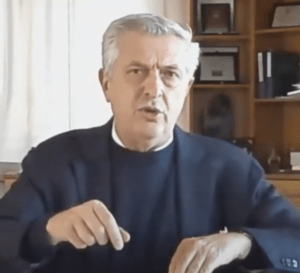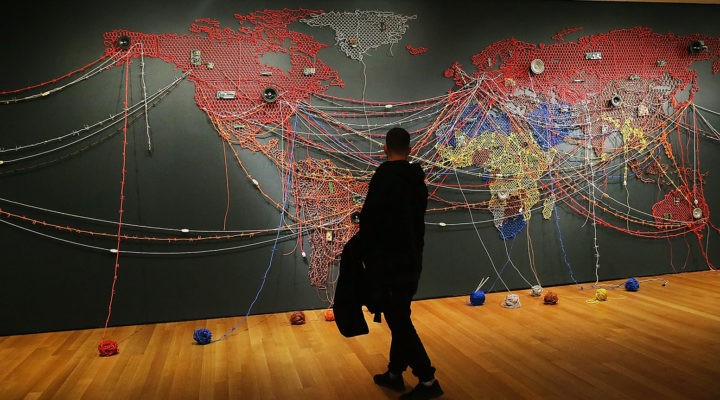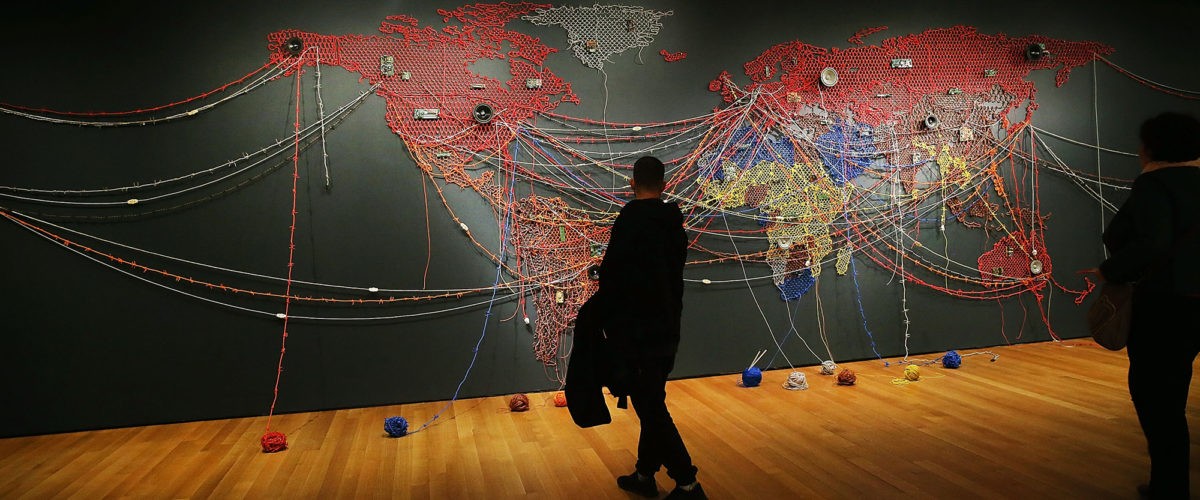The global migration crisis isn’t just about people trying to come to the United States, the top refugee official from the United Nations said.
Yet amid this massive worldwide migration, the U.S. must adhere to its treaty and legal obligations to provide a humane and effective asylum system, said U.N. High Commissioner on Refugees Filippo Grandi. He spoke during the global migration session of “Leading the Way,” the 2021 gathering of the National Immigration Forum Oct. 25-26.
“We should dispel the notion that everybody is moving north to the U.S., though that is a very important access of movement,” Grandi explained, adding that numerous countries in Central and South America are experiencing high levels of migration, in addition to significant numbers of internally relocated people.

Filippo Grandi
“Increasingly we see people seeking asylum and protection in Mexico. People from Nicaragua flee essentially southwards to Costa Rica, and there is a lot of internal displacement” in several countries.
Some of the factors driving migration globally and regionally “are economic, some are social, with … violence being a very primary driver of displacement,” he said. “The people we care for are the people who need protection, especially international protection. It is a very complex situation.”
U.S. obligations
Grandi’s presentation on the topic of “Solutions in an Era of Global Migration” was moderated by World News Group Senior Editor Mindy Belz and included an overview of factors driving migration increases in other parts of the world, including Afghanistan and Myanmar, and a nudge to end Trump-era policies keeping the U.S. from honoring its moral and legal responsibilities to help asylum seekers and other refugees.
He noted that the U.S. is a signatory to the 1967 protocol of the 1951 Refugee Convention, which includes a requirement that asylum seekers should not be deported to their home countries without due process to verify the dangers they had fled, which may include imprisonment, death or further displacement. The U.S. Refugee Act of 1980 underscores that requirement.
“Unfortunately, hundreds of thousands of people have been deported without due process, and this continues to happen,” Grandi said.
“Unfortunately, hundreds of thousands of people have been deported without due process, and this continues to happen.”
The Biden administration has continued to use Title 42, a U.S. health code provision first invoked by the Trump administration to bar or deport migrants, ostensibly to stop the spread of COVID-19. And due to a recent Supreme Court ruling, the White House has announced it will reinstitute the Migrant Protection Protocols, a Trump policy through which immigrants are returned to Mexico to await immigration hearings.
The U.N. has been urging the Biden administration to heed its own promise to create an effective and humane immigration system, Grandi said. “That is why we are saying to the United States, give people access to process. It doesn’t mean everybody will become a refugee and will get asylum, but give them access to process. Unfortunately, the escalation of this movement and the slow pace of reform of the asylum system and the immigration system of the United States has caused a gigantic backlog that makes access to due process more and more complicated.”
Grandi acknowledged that the pandemic “has complicated everything” when it comes to international immigration and asylum policies. But time has shown that it is possible to continue effective immigration practices while maintaining public health.
Uganda reached out to the U.N. for help establishing quarantine and testing practices that kept its immigration process working, he added. “They proved that you can both protect populations from the virus and protect asylum seekers from the risks they are fleeing from without obliging them to go back to conflict and to violence.”
That is the example presented to the U.S. to end Title 42, Grandi added. “The time has come to lift that restriction and to adopt measures that other countries have also adopted to manage asylum requests without deporting people indiscriminately because of health risks.”
Afghanistan
Belz asked Grandi to discuss the plight of Afghan refugees in light of the recent departure of coalition forces and subsequent takeover by the Taliban. His response included praise for the U.S. decision to increase its current annual refugee ceiling to 125,000: “I hope a sizeable chunk of that new quota can be utilized for Afghan refugees — of those already existing in the vicinity of Afghanistan.”
“Let’s not forget the millions of Afghan refugees, preceding this crisis, in Pakistan and in Iran.”
Grandi said he is not overly concerned about the tens of thousands of Afghans recently evacuated from the nation by the U.S. and other nations, including those who had worked with U.S. forces and their allies. “That’s a finite problem. It’s not going to become much bigger,” he said.
“Let’s not forget the millions of Afghan refugees, preceding this crisis, in Pakistan and in Iran,” Grandi said. “Many of them … are in need of resettlement to third countries where they can be more secure.”
And the world community must seek to negotiate with the Taliban to mitigate the conditions that could lead to further migration from Afghanistan, he said.
But negotiating with the Taliban does not look promising, according to a new report by the U.S. Committee on International Religious Freedom.
“Religious freedom conditions in Afghanistan have deteriorated since the Taliban seized control of the country on Aug. 15, 2021,” the USCIRF fact sheet explains. “In September 2021, despite promises to form an ‘inclusive’ government, the Taliban announced an all-male, religiously, and ethnically homogenous cabinet. Also in September 2021, the Taliban reinstated the Ministry for the Propagation of Virtue and Prevention of Vice, which uses a notoriously violent hardline Islamist policing system.”
Yet the effort has to be made to stave off further humanitarian — and immigration — disasters in Afghanistan, Grandi said.
“I think this convergence will be complex and difficult, but it is possible and …. we will have averted the worst and we will have laid the groundwork for an Afghanistan … that will at least preserve the country and be stable and respect the rights” of its people, Grandi said.
Other world hot spots
Afghanistan and the Americas are not the only regions where migration has reached critical levels, he continued. Myanmar, formerly known as Burma, has generated 1 million refugees whose plight has been worsened since a military coup in February.
And Grandi said he is “worried” about conditions in West Africa, where a combination of climate change, armed conflict and terrorism is generating mass displacement of populations across the region.
Syria also continues to be a major source of misery and migration, with half the population known to be displaced at some point.
“We have to think of humanitarian responses for all these displaced populations, and we also have to think more creatively about solutions for all of them so that we give them a light at the end of the tunnel,” he said.
Related articles:
Want to help slow immigration to the U.S.? Address global hunger
Buckle up: Global turbulence ahead | Analysis by Erich Bridges


